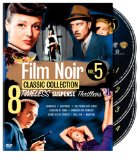| Reviews & Columns |
|
Reviews DVD TV on DVD Blu-ray 4K UHD International DVDs In Theaters Reviews by Studio Video Games Features Collector Series DVDs Easter Egg Database Interviews DVD Talk Radio Feature Articles Columns Anime Talk DVD Savant Horror DVDs The M.O.D. Squad Art House HD Talk Silent DVD
|
DVD Talk Forum |
|
|
| Resources |
|
DVD Price Search Customer Service #'s RCE Info Links |
|
Columns
|
|
|
Film Noir Classic Collection, Vol. 5
THE MOVIES:
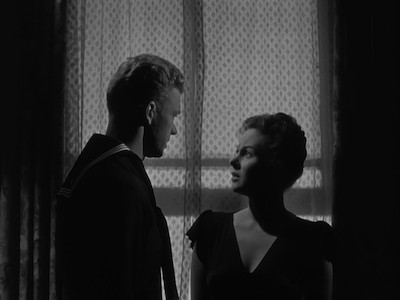
It's been three years since the last volume of the Warner Bros. Film Noir Classic Collection series, long enough that most of us had given up the program for dead. Like the proverbial wronged man in any of the many films that have been collected under the title over the years, it had retreated to some far-flung wilderness, hiding from its past, hiding from those who would find and consume it.
Someone must have squealed, because lo and behold, here is the Film Noir Classic Collection, vol. 5. Eight movies on four discs, now packed in a tight folding box. Surprisingly, the fifth volume doesn't have any big lead features. Usually, we get a couple of famous films to draw the casual viewer, and the rest of the set is packed out with lesser-known B-features. (So, if your fingers were crossed in hopes of getting The Blue Dahlia, keep 'em crossed and keep hoping.*) For vol. 5, all the movies are from deep in the vault. A few are by big genre directors, a few have bankable stars and recognizable character actors, but I had not heard of or seen a single one before the boxed set arrived.
This, for my money, is a good thing. New discoveries await!
Then again...
Disc 1
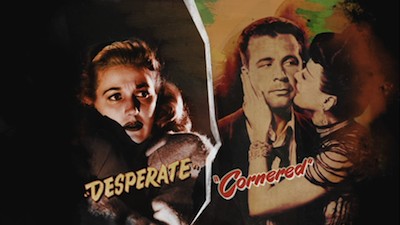
* Desperate (1947): Tough guy director Anthony Mann (The Furies, Railroaded!) leads this volume with a taut on-the-run thriller. Steve Brodie stars as Steve Randall, an upstanding truck driver who takes the wrong job when he's promised the right kind of reward. The trick is he's been booked by an old pal from the neighborhood, Walt Radak (Raymond Burr), and instead of hauling legitimate goods, Radak's gang intends to unload someone else's warehouse into the back of Steve's trailer. When Steve tries to stop them, a cop ends up dead and Walt's little brother goes to jail. Walt wants Steve to turn himself in, or he'll kill Mrs. Randall (Audrey Long, Born to Kill). Steve grabs the wife and takes it on the lam.
The story for Desperate was cooked up by Mann and an otherwise forgotten writer named Dorothy Atlas, but the script by Harry Essex (Kansas City Confidential) tends on the sparse side. The plot meanders quite a bit. Steve runs to one hiding place, returns to the city to try to clear his name, runs back to the hiding place, runs to the next, tries to send the missus further, etc. It requires a small suspension of disbelief to keep it all going. Time stretches, the cops look one way and then the next, it's a bit far-fetched. Steve Brodie is also a bit too milquetoast, the guy has no real acting chops. On the other hand, Raymond Burr is remarkable as the villain. Based on this menacing performance, he could have easily been typecast as the bad guy had Perry Mason not come his way.
Mann directs with his usual hardboiled style. There is no muss or fuss in an Anthony Mann picture. Each scene gets exactly what it requires, nothing more. My guess would be that the director tried to cut the script down to the bare essentials to keep it tense and moving, and his compositions and editing make the blood boil in all the ways the screenplay lacks. Keep an eye out for the extreme close-ups, such as the broken bottle that looks like it's going to stab right through the screen.
* Cornered (1944): The second feature on the lead disc is also a lesser effort from an esteemed director: Edward Dmytryk, the man behind such films as Crossfire and Broken Lance. Cornered is a post-War suspense picture, starring Dick Powell in his first role after playing Philip Marlowe in Murder, My Sweet. This time he plays Laurence Gerard, a Canadian pilot who fought in occupied France. There, he met and married a French girl. He left her to try to get her a passport back to his home country, and while he was gone, a collaborator sold her out to the enemy. Hellbent on revenge, the shell-shocked soldier goes looking for her killer, Marcel Jarnac (Luther Adler), only to find he has allegedly killed himself. Gerard doesn't buy it for a second, and so he goes to Buenos Aires to find Jarnac's widow (Micheline Cheirel).
In Argentina, Gerard stumbles into a convoluted network of ex-patriots. Some appear to want to protect Jarnac, others deny he is still around, and even others claim to have the same goal as Gerard. He doesn't know who to trust, so he chooses to trust no one, though most of the time, when he thinks he's playing them, they are playing him.
Like Desperate, Cornered suffers some from a script that wanders too much at times. There are a lot of participants on the field, and Powell is allowed to weave through them at a pace far too calm for the anger the man regularly exhibits. The actor has a kind of everyman blankness that, when combined with his character's penchant for combat flashbacks, morphs into a lumbering compulsion. Gerard plods forward, his legs and spine stiff, like a Frankenstein monster juiced by vengeance. The supporting cast offers very little extra electricity. Nina Vale is more icy than sensuous as a South American temptress, and Walter Slezak (Lifeboat) is unremarkable as the chubby tour guide who is supposed to have Buenos Aires wired (a.k.a. the Sydney Greenstreet role).
Really, there is very little to distinguish Cornered. There is some surprising cynicism about the war given how fresh the victory was at the time, but other than that, it's a fairly standard missing persons movie. Still, Edward Dmytryk's assured hand means the movie is always watchable, even if it's not that memorable.
Disc 2
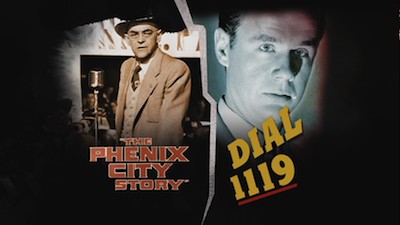
* The Phenix City Story (1955): This creatively ambitious docudrama ended up being the first duff track in the set for me. The movie opens with some staged documentary footage--interviews with real people from Phenix City, Alabama, where the citizens eventually rose up to take down crime bosses who were strangling their community with all manner of vice. It takes the concept of a "cold open" a little too far, though, and I was more than ready for the movie to move on and get into the film proper.
What follows in The Phenix City Story doesn't quite rise out of that slump, unfortunately. Phil Karlson's story of small-town values and right vs. might has the rough edges of an independent production, loading lesser-name yet familiar actors into the roles of the real life crooks and crusaders--allegedly with such an attention to detail that he even had them wear the actual clothes of their counterparts. My guess is that Karlson (Kansas City Confidential) was going for version of Jules Dassin's The Naked City for the American South, but he never quite gets there. Wooden dialogue is made all the more stiff by wooden acting, scenes go on longer than they should, and production values are so low-rent, at one point, what is supposed to be the dead body of a child is clearly a mannequin. Though based on fact, The Phenix City Story often succumbs to hokey histrionics and melodrama, causing it to look like it desperately wants to be a regular Hollywood picture but just doesn't know how. It's a shame all those great locations couldn't be put to better use.
The Phenix City Story is one of those movies that I admire for its progressive stance and aesthetic determination, but boy, was it boring to watch.
* Dial 1119 (1950): Oh, what a difference a good screenplay makes. Dial 1119 may be a fairly conventional mad-gunmen picture, but even though John Monks Jr.'s scripting stays within the genre confines, the cast of hostages is filled out with distinct, believable individuals.
Three years ago in Terminal City, Gunther Wyckoff (Marshall Thompson, Mystery Street) was convicted of murder, but instead of being executed, he was declared insane and sent to a mental hospital. Now he's escaped, and with the manhunt on his heels, holed up in a downtown bar. He has five hostages: a past-her-prime barfly, an expectant father, a secretary, the lecher trying to get in her skirt, and a fed-up reporter. Gunther holds them at gunpoint, and as he waits for the police psychiatrist (Sam Levene) that handled his previous case, they each try in their own way to plead for escape. In between, Gunther shares his delusion--sometimes on purpose, but not always.
Marshall Thompson is a little stiff, but the actors playing the hostages are really good. Virginia Field (A Connecticut Yankee in King Arthur's Court) is especially engaging as Freddy, the alcoholic with the caustic sense of humor who tries to work her fading sex appeal. James Bell (Crime Wave) is not dissimilar to Jack Lemmon in the way he plays the reporter. William Conrad also has a role as a bartender.
Monks (The House on 92nd Street) and director Gerald Mayer (Inside Straight) keep the action confined, but that doesn't mean there isn't room for more within the drama. Within the various scenarios, questions of morality, war, and even an early critique on television journalism are raised. The climax also takes a surprising turn, with one death and one act of heroism most viewers won't see coming.
Disc 3
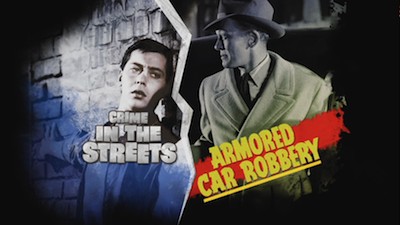
* Armored Car Robbery (1950): Though this movie tells you exactly what it's about in the title, the actual robbery happens rather early in the picture. The bulk of the story is about the aftermath. When the heist doesn't go as planned, it puts the gang of crooks on the run, and their hard-bitten leader, Dave (William Talman, The Hitch-Hiker), isn't going to let anything get in the way of his escaping with the loot, not even his gang. Adding to the pressure is the fact that Dave killed a cop when fleeing the scene, and so his partner (Charles McGraw, The Defiant Ones) has extra motivation for seeing justice done. Adding a feminine touch to the mix is Adele Jergens (Side Street), a burlesque dancer married to one of the robbers (Douglas Fowley, Mighty Joe Young) who is two-timing hubby with Dave.
Armored Car Robbery is a bit too laid back in terms of pacing. Even at a short 68 minutes, director Richard Fleischer (The Narrow Margin) seems to be taking his time with it. What the picture lacks in urgency, however, it makes up for in detail. Armored Car Robbery has no great plot innovations, but we do get to see just about every aspect of the manhunt. Fleischer and writers Earl Felton and Gerald Drayson Adams use all the building blocks at their disposal to put together a solid movie, one that operates on a fairly sturdy sense of logic. Frankie is the leader of a street gang called the Hornets, as proclaimed on the back of their satin jackets. We are first introduced to them in a street rumble, which Siegel stylishly boxes into the opening credits. The Hornets are getting revenge against some rivals for roughing up their youngest member, Baby (Sal Mineo). When a neighbor sees one of the kids has a zip gun, he reports him and gets him arrested. Frankie decides his best revenge would be to kill the old man (Malcolm Atterbury) and make Baby and another kid (Mark Rydell) go along with. As things heat up, we see Frankie's home life. He lives alone in a tiny apartment with his mom (Virginia Gregg) and little brother (Peter Votrian), and it's implied that not only did Frankie take a beating from his old man, but he and the younger kid might not even have the same father. There are a lot of questions about what makes one teen go bad and another stay good, and one of the best scenes in the movie features Baby's father (Will Kuluva) asking him just that. Siegel frames it so that Mineo is in the forefront, pushed to the right of frame, and Kuluva is behind him, pleading with him. Mineo barely has any lines, but he's constantly reacting. A method actor just like Cassavetes and James Dean (whom Mineo co-starred with in Rebel Without a Cause), Mineo gets a lot out of this segment, pretty much stealing the picture in just a couple of minutes. Siegel takes an interesting approach to most of Crime in the Streets. He favors long, theatrical scenes, often panning away from one set of characters to pick up another further down the city block where most of the movie takes place. The set-ups reminded me a lot of live television productions from the period, particularly the kind of work John Frankenheimer would do on the drama anthology shows. It adds some zazz to what is otherwise a fairly ordinary sort of movie. It's still not a great film, but what could have been just another B-reel cliché takes on a totally different life thanks to the energy of all the young talent on the screen. Disc 4 * Backfire (1950): Another crime drama featuring men who had lost their way after the war. Bob Corey (Gordon MacRae, The West Point Story) and Steve Connelly (Edmond O'Brien, D.O.A.) shared combat from inside a tank, and they dreamed of being civilians again, when they'd get a ranch or some other business full of open spaces. The only hitch is that Bob has been laid up in a Veteran's Hospital since they got out, and even once the doctors get his legs fixed, he's not going to be able to do any strenuous work. Steve holds on to the dream, but by the time Bob is on his feet again, he's gotten desperate and is wanted for murder. What follows is a story told in flashbacks, though not of the twisty-curvy kind. Bob goes looking for Steve and each person he meets tells him the next piece of the story. Steve got mixed up with a beautiful nightclub singer (Viveca Lindfors, 1950's Dark City) while he was providing muscle for a gambler named Lou Walsh. This is how he got tangled in another gambler's murder, but Bob stays convinced that Steve is innocent. There aren't a lot of surprises along the way, though there are some nice moody scenes where whoever is doing the killing creeps through the bushes and the rain to take out witnesses. Backfire was directed by Vincent Sherman (The Damned Don't Cry) from a story by Larry Marcus (also Dark City). It's told efficiently enough that it holds one's interest. The lead men are kind of starchy, but Ed Begley has some fun ranting and raving as a homicide detective, and Sheila MacRae turns in a fine comic performance as the singer's goofier roommate. All in all, a B-movie that earns its B. * Deadline at Dawn (1946): In terms of writing, Deadline at Dawn has the best pedigree of the bunch. Based on a novel by the great Cornell Woolrich, the screenplay is by Clifford Odets, the inspiration for Barton Fink and the writer of many a classic film, including Sweet Smell of Success. Unsurprisingly, Deadline at Dawn is one of the more structurally interesting films in Film Noir Classic Collection, vol. 5. As the title suggests, it takes place over one night. In New York City, a country-boy sailor (Bill Williams) on leave ends up drinking too much and absconding with a date's cash. When he goes to give it back to her, he finds her dead. He is due to get on a bus and return to base in the morning, and he's determined to clear his name by then. The sailor, Alex, ends up enlisting the help of another city transplant. June (Susan Hayward, House of Strangers) is also from out of town, but she's been in New York long enough to have given up her acting career for taxi dancing at a skeevy club. She takes pity on the baby-faced lunkhead, and the two try to recreate what would have happened after the murder. They track down various suspects, including people the woman was blackmailing and her brother, a well-known gangster (Joseph Calleia). Deadline at Dawn gives us a lot of glimpses of the varying denizens of the city. Some folks are average working stiffs, such as all the immigrant taxi cab drivers, some are not nearly so nice. There is the man who is obsessed with June who wears gloves on his hands to cover a rash, and there is a blind piano player who was shaking down the shakedown artist. In one of the more unique scenes, Alex follows a nervous fellow who he suspects of being the murderer, but the man only turns out to be trying to find a vet to save his cat. The feline choked on a chicken bone, and by the time the man gets to where he's going, it's dead. It's the kind of sad, late-night detail that observant writers keep in their back pocket for just such an occasion. Too bad Deadline at Dawn lacks the verve the script demands. Director Harold Clurman was apparently a noted stage director, and in this, his lone feature, he doesn't really get a handle on the motion picture business. The pacing is too slow for a movie that has a ticking clock hanging over it (a problem not dissimilar to that of Armored Car Robbery). He lets the actors take their time with the dialogue--a particularly bad choice when you've got a lead as dull as Bill Williams. The actor has quite a lot of credits on his IMDB page, but it's no wonder I've never heard of him. He's a real stiff. Susan Hayward can't do anything around him, and the movie only perks up when she's going one-on-one with Paul Lukacs, a cab driver who ends up shuttling her around. Still, Deadline at Dawn works well, and it's a pleasure to watch the mechanics of such a machine work. Not a bad way to end the set. * And as pointed out in our forum, you might also want to look at a different studio for that. Woops! THE DVD Video: The set-up for each disc begins with a main menu that is a split-screen for both movies featured. Select the one you want, and the DVD takes you to an individual menu for that film, where you can choose to play it, choose subtitles, or back up to the main menu, or for the two films with theatrical trailers, you can select those. Sound: Subtitles are available for the deaf and hearing impaired, as well as alternate language subtitles in French and Spanish. Extras: As mentioned above, the packaging for Film Noir Classic Collection, vol. 5 drops the individual cases and instead sticks the movies in a nicely decorated foldable book, which then fits in a nice outer slipcover. The interior has disc by disc info, as well as the poster credits for each movie. The four discs sit by themselves in plastic trays with large photos under the clear plastic. FINAL THOUGHTS:
Jamie S. Rich is a novelist and comic book writer. He is best known for his collaborations with Joelle Jones, including the hardboiled crime comic book You Have Killed Me, the challenging romance 12 Reasons Why I Love Her, and the 2007 prose novel Have You Seen the Horizon Lately?, for which Jones did the cover. All three were published by Oni Press. His most recent projects include the futuristic romance A Boy and a Girl with Natalie Nourigat; Archer Coe and the Thousand Natural Shocks, a loopy crime tale drawn by Dan Christensen; and the horror miniseries Madame Frankenstein, a collaboration with Megan Levens. Follow Rich's blog at Confessions123.com.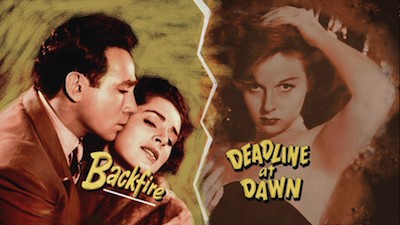
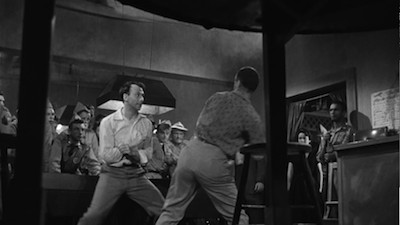
Two of the movies in Film Noir Classic Collection, vol. 5 are presented in black-and-white widescreen. The Phenix City Story and Crime in the Streets are matted to preserve their aspect ratios, while the rest of the films conform to their more standard full frame presentations. All of the movies look fairly good, with only a minor amount of scratching and debris (Crime in the Streets has the most noticeable print noise). The blacks are pretty solid, if not super strong, and the contrast generally looks good.
All of the films are mixed in mono and sound fine. There is no cause for celebration, nor any for alarm--decent transfer of quality source material to disc.
There are no extras on the discs outside of two trailers: one for Cornered and the other for Dial 1119.
Recommended. I hate to say, but I'm a little disappointed in Film Noir Classic Collection, vol. 5. The series so far has set a pretty high standard, and this fifth outing digs deep into the barrel for its 8 movies. There's not an out-and-out winner among them--though Crime in the Streets, Dial 1119, and Deadline at Dawn are all worth a look for genre aficionados. Most of the movies are at least interesting enough to hold one's interest, and spread over a few nights, I wasn't skittish about going back for more. The packaging and presentation are swell, as always, I just wish the box had at least a couple of real humdingers to make it worth the long wait. 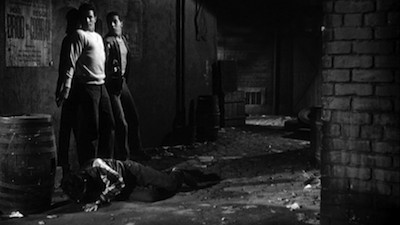
|
| Popular Reviews |
| Sponsored Links |
|
|
| Sponsored Links |
|
|
| Release List | Reviews | Shop | Newsletter | Forum | DVD Giveaways | Blu-Ray | Advertise |
|
Copyright 2024 DVDTalk.com All Rights Reserved. Legal Info, Privacy Policy, Terms of Use,
Manage Preferences,
Your Privacy Choices | |||||||









